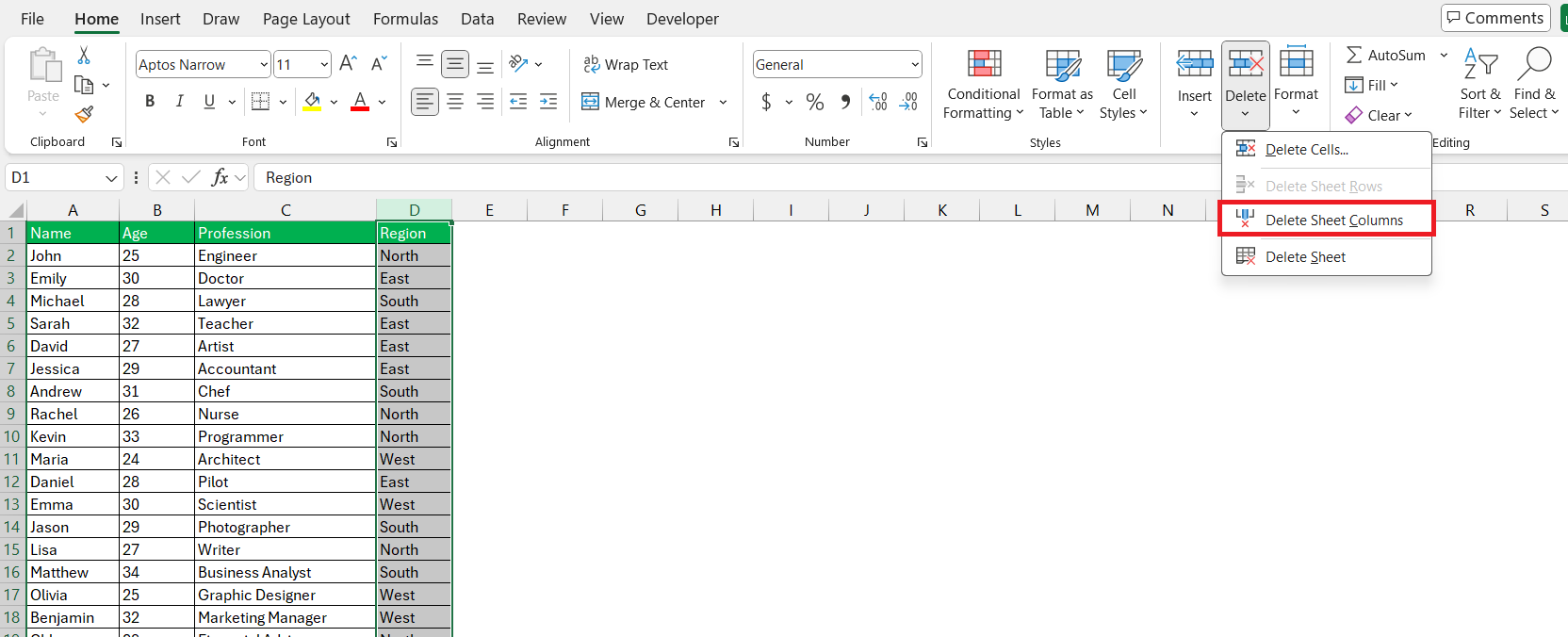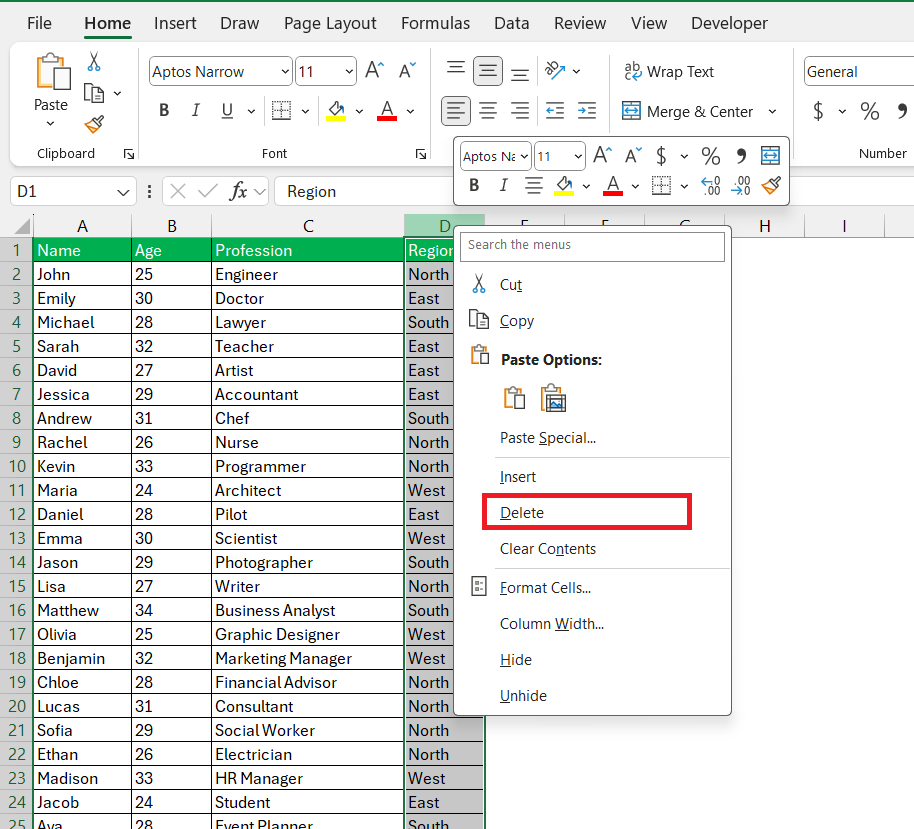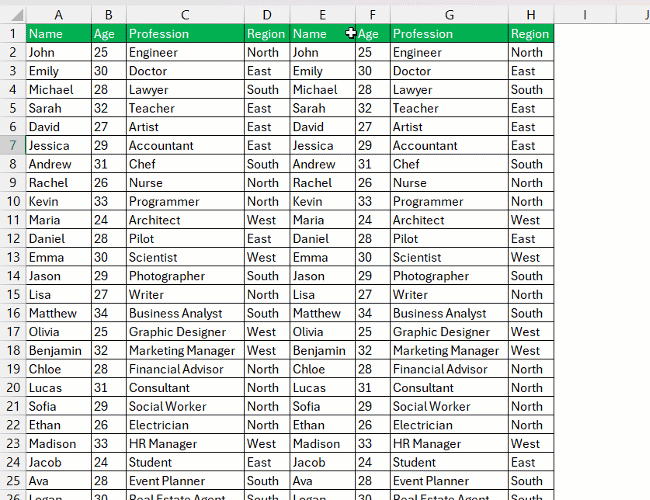Deleting columns in Microsoft Excel is a straightforward task that helps streamline data organization and analysis. Whether you’re removing unnecessary information or restructuring your spreadsheet, Excel provides several methods to achieve this. In this guide, we will cover a detailed tutorial on how to delete columns in Excel.
Key Takeaways:
- Removing unnecessary columns declutters your spreadsheet, making relevant data easier to find and analyze.
- A streamlined view improves productivity by focusing attention on essential information, reducing processing time and potential errors.
- Delete columns that are redundant, outdated, or not contributing to your analysis to maintain a clean and organized spreadsheet.
- Before deleting columns, review and back up your data to prevent accidental loss of valuable information.
- Use Excel’s ribbon options, right-click menu, or keyboard shortcuts like Ctrl + – for quick and effective column removal, tailored to your workflow and preference.
Table of Contents
Introduction to Efficient Spreadsheet Management
The Challenge of Cluttered Spreadsheets
Efficient spreadsheet management is crucial for anyone juggling data. When faced with cluttered spreadsheets, it can feel like navigating a maze. Every additional, unnecessary column can clutter your view, making it tough to spot the information that matters most. Tidying up those spreadsheets not only brings clarity but also sets the stage for better data analysis and decision-making. Think of it as decluttering your workspace—less mess, less stress.
Enhancing Productivity with Simplified Data Views
A simplified data view is like a breath of fresh air for your productivity. By deleting extraneous columns, you create a streamlined spreadsheet that lets you focus on the data that truly impacts your work. This clarity can lead to faster data processing and analysis, making your tasks more efficient and less error-prone.
Plus, sharing these cleaner spreadsheets means your colleagues can also appreciate and understand your data without the distraction of irrelevant details.
Identifying the Need for Column Removal
When Should You Delete Columns in Excel?
You should consider deleting columns in Excel when they’re no longer relevant to your analysis, contain outdated information, or are simply taking up precious space. This can include duplicate data, blank columns, or information that has been consolidated elsewhere. Additionally, if you’re preparing to present or share the spreadsheet, removing non-essential columns can help make your data more accessible and easier to interpret for your audience.
Preparing Your Spreadsheet for Column Deletion
Before you begin deleting columns willy-nilly, take a moment to ensure you’re not discarding valuable information. Review your data and determine which columns are superfluous to your current needs. It’s wise to create a backup of your spreadsheet; that way, if you accidentally remove something important, you have a safety net. If you’re part of a team, a quick consultation with colleagues to confirm that certain data can be deleted might save you a headache down the line. Preparation can often be the key to a smooth, regret-free column removal process.
Quick Methods on How to Delete Columns in Excel
Method 1: Using Excel’s Ribbon to Efficiently Remove Columns
For those preferring the ribbon’s visual cues, here’s how to remove columns efficiently: after selecting the column by clicking on the header, navigate to the Home tab. Look for the ‘Cells’ group, then click on ‘Delete’ and choose ‘Delete Sheet Columns.’ Voilà!
The unwanted columns wink out of existence. This method is intuitive and perfect when you’re handling a moderate number of columns that need to be removed.
Method 2: Right-click and Delete for On-the-go Adjustments
When you’re making on-the-fly adjustments to your spreadsheet, right-clicking is your quick-fix tool. Start by selecting the column header(s) you wish to vanish. Next, give them a right-click, and from the contextual menu that pops up, choose ‘Delete’.
This method is superbly handy when you’re working swiftly through your data and want to keep mouse movements to a minimum. It’s also a great way to keep your train of thought chugging along without interruption.
Excel Tips and Tricks for Organizing Data
Shortcut Keys to Streamline Spreadsheet Editing
Did you know that your keyboard holds the key to supercharged spreadsheet editing? Using shortcut keys can drastically cut down the time you spend managing your data. For column deletion, the combination of Ctrl + - (minus) is your express ticket to efficiency?
Select a column and press these keys together to prompt the delete dialog. Opting for shortcuts like these reduces the reliance on your mouse, keeping your hands on the keyboard and your workflow in the fast lane.
Deleting Multiple Columns Simultaneously with Ease
If you need to delete multiple columns at once, Excel has got you streamlined. Whether they’re adjacent or scattered across the sheet, you can bid farewell to them in a swift move. For consecutive columns, click on the first header, hold down Shift, and click on the last header in the sequence to select all.
If the columns are not neighbors, hold Ctrl as you click on each header. Once your selection is made, press Ctrl + - or right-click and hit ‘Delete’. Just like that, you’ve cleaned up multiple columns and saved precious time.
Common Pitfalls and How to Avoid Them
Troubleshooting Tips
If you’ve tried to delete blank columns but they persist, it’s likely because they’re not truly empty. Invisible characters like spaces, non-breaking spaces, or other non-printing characters often linger undetected, especially in sheets with imported data.
To unveil these stealthy stowaways, select the first cell and press Ctrl + ↓. If the cursor stops before the end of the sheet, something’s there. Double-click the cell to inspect, or hit Delete to clear the contents. Repeating this process throughout the column helps ensure a thorough clean-up, and using the ‘TRIM’ function can strip out those sneaky, leading, and trailing spaces.
Ensuring Data Integrity While Removing Columns
Maintaining data integrity is paramount when deleting columns. Carelessness here can lead to irretrievable loss or misinterpretation of crucial information. Before removing anything, double-check the column’s relevance, and ensure its data isn’t needed for future analysis or isn’t referenced by formulas elsewhere.
Once confirmed, instead of outright deletion, you might want to hide the column temporarily—a safe step that preserves data but keeps it out of sight. This cautious approach can prevent mishaps while keeping your spreadsheet tidy.
FAQ: Simplify Spreadsheets Quickly and Effortlessly
What’s the quickest way to remove blank rows or columns in Excel?
The quickest way to remove blank rows or columns in Excel is by using the ‘Go To Special’ feature. Select the area you’re working with, go to ‘Find & Select’ on the Home tab, click ‘Go To Special’, then choose ‘Blanks’. This highlights all blank cells. For rows, right-click and select ‘Delete Row’, and for columns, pick ‘Delete Column’.
How do you delete thousands of blank columns in Excel efficiently?
To delete thousands of blank columns in Excel efficiently, press Ctrl + Space to select a column, then use Shift with the arrow keys to select additional columns. Right-click on the highlighted area and choose ‘Delete’. For a vast number, use the ‘Go To Special’ dialog, select ‘Blanks’, and delete the selected columns in bulk.
What kind of shortcuts can I use to delete columns faster in Excel?
To delete columns quickly in Excel, try shortcuts like Ctrl + - (minus key), which opens the delete dialog for selected cells or columns. Alternatively, Ctrl + Space to select a column then Ctrl + - to delete without a dialog. For Mac users, the shortcut is Cmd + Shift + - (minus key).
Are there any risks in using macros for deleting columns in Excel?
Yes, using macros to delete columns in Excel carries some risks. If not coded correctly, a macro might remove necessary data or affect other parts of your spreadsheet. Always back up your files and understand what the macro is programmed to do before running it. Use macros from trusted sources or write them yourself if you’re familiar with VBA.
What if you need to delete multiple columns in your worksheet?
If you need to delete multiple columns in your worksheet, select the first column, hold down Shift, and click the last column you want to remove. This selects all intervening columns. Alternatively, use the Ctrl key to select non-adjacent columns. Then right-click on any of the highlighted headers and click ‘Delete’.
John Michaloudis is a former accountant and finance analyst at General Electric, a Microsoft MVP since 2020, an Amazon #1 bestselling author of 4 Microsoft Excel books and teacher of Microsoft Excel & Office over at his flagship MyExcelOnline Academy Online Course.











